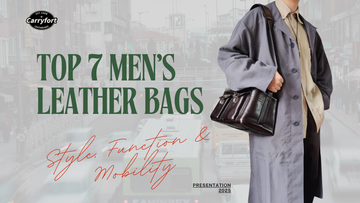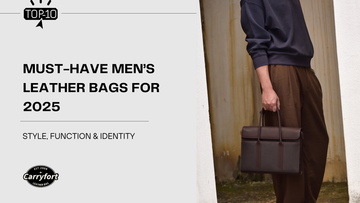In today’s leather goods market, the line between authentic and synthetic has never been more blurred. With a flood of cheap alternatives labeled as “genuine leather” or “PU leather,” even seasoned shoppers may struggle to identify the real thing. For anyone investing in a leather bag—be it a classic leather backpack for men, a professional leather laptop bag, or a versatile messenger bag—understanding how to distinguish real leather from fake is a must-have skill.

Real leather isn’t just about aesthetics—it’s about longevity, character, and craftsmanship. The way it feels in your hand, the earthy scent, the natural imperfections of the grain—these are all clues that separate premium products from mass-produced imitations. Fake leather bags may look similar on the surface, but they lack the breathability, durability, and unique patina that only full-grain or vegetable-tanned leather can offer.
In this comprehensive guide, we’ll break down the key methods to verify authenticity, using touch, sight, and even smell to help you make an informed choice. We’ll also explore common industry tricks, such as the misleading use of the term “genuine leather,” and how to avoid falling for them.
👉 Curious about leather types and how they impact quality? Check out our detailed breakdown in Leather Grades Explained: Full-Grain vs. Genuine.
Whether you’re buying your first brown leather crossbody bag or upgrading to a carry-on leather duffle built for a lifetime, this guide is your starting point to shopping smart—and with confidence.
Why It Matters: The True Value of Real Leather
Before diving into the specifics of testing leather authenticity, it’s important to understand why real leather is worth your attention. Authentic leather is not just a material—it’s an investment. When properly cared for, a full-grain leather bag can last for decades, developing a rich, individual patina that tells your story over time. In contrast, synthetic leather tends to crack, peel, and deteriorate after a short lifespan, especially with frequent use.
Whether you're shopping for a men’s leather briefcase for the office, a leather crossbody bag for weekend city strolls, or a leather duffle bag for travel, the difference lies in durability, feel, and long-term appearance. Real leather is breathable, naturally resistant to tearing, and ages beautifully. Fake leather may seem like a budget-friendly alternative, but it lacks the soul and structure of genuine craftsmanship.
Moreover, full leather bags are often handcrafted in small batches using traditional techniques—this not only supports ethical manufacturing but also results in better stitching, structure, and long-term reliability. A real leather messenger bag won't just carry your gear—it becomes part of your everyday ritual, something you feel proud to own and use.
✨ Want to understand which leather is best for your needs? Explore Vegetable Tanned vs. Chrome Tanned Leather: Which Should You Choose?
Texture Test: What Real Leather Feels Like
One of the easiest ways to tell if a leather bag is genuine is by simply running your fingers across its surface. Real leather feels slightly uneven, warm, and supple to the touch. You might notice natural wrinkles, pores, or grain variations—especially on full-grain leather messenger bags or vintage leather travel bags.
In contrast, fake leather often feels cold, overly smooth, and uniform. Since it's made from synthetic materials like polyurethane or PVC, it lacks the organic imperfections that make real leather unique. If your bag feels plasticky, stiff, or overly shiny, it’s likely not the real deal.
Another sign is flexibility. Real leather bends naturally and slowly returns to its original shape, while synthetic leather may feel rigid or crease awkwardly when folded. This is especially noticeable on a leather laptop bag or leather shoulder bag that’s been broken in with use.
🔍 Bonus tip: Lightly scratch the surface of the bag with your fingernail (in a discreet spot). Real leather may show a temporary mark that fades with time—synthetic won’t react the same way.

The Smell Test: That Irreplaceable Leather Aroma
One of the most distinctive ways to identify real leather is through its smell. Genuine leather has a rich, earthy aroma—a mix of natural oils, organic fibers, and, in the case of vegetable-tanned leather, subtle woody or smoky notes. It’s warm, musky, and unmistakable, especially when you open a new leather backpack or men’s leather laptop bag.
By contrast, fake leather (PU, PVC, or bonded leather) often gives off a strong chemical or plastic-like odor. This is due to the artificial dyes, adhesives, and plasticizers used during manufacturing. If the bag smells synthetic or overly “factory-like,” it's a red flag.
This test is particularly reliable because scent is difficult to replicate authentically. While some manufacturers try to add leather-like fragrance to faux leather, it’s often too artificial and fades quickly. Real leather, on the other hand, retains its distinctive aroma over time—especially when it's high-quality full-grain.
💡 Try this next time you're shopping: Hold the leather close to your nose and take a deep breath. If it doesn’t evoke that natural warmth, it’s probably not the real deal.

Fire & Water: The Advanced Tests for Real Leather
If you’ve already checked the texture and scent of a leather bag but still aren’t convinced, there are two more methods that offer deeper insights—the fire test and the water absorption test. While not recommended for use in a store, they’re excellent for small swatches or at-home testing.
🔥 Fire Test
Real leather is naturally flame-resistant. When exposed to a flame briefly, it may darken and give off a smell similar to burning hair—because it’s made from animal hide. In contrast, fake leather often melts or bubbles and releases a sharp chemical or plastic smell. This is a telltale sign of synthetic materials like PU or PVC.
⚠️ Tip: Never perform this test on a finished product. Use only if you have access to a scrap or sample piece.
💧 Water Absorption Test
Genuine leather is porous and breathable. When you place a drop of water on it, the leather will slowly absorb it, darken slightly, and then dry back to its original tone. This reaction confirms it’s natural hide.
Fake leather, on the other hand, repels water. The droplet will sit on the surface and eventually roll off, indicating a synthetic coating that blocks absorption.

Looking for authentic leather? All our bags—like the leather waist bags and messenger bags—are made from full-grain cowhide that passes both visual and touch tests. No shortcuts, no synthetics.
Visual Clues: Grain, Edges & Stitching Secrets
When it comes to spotting real leather, your eyes can tell you more than you think. Genuine leather carries imperfections, texture depth, and craftsmanship details that mass-produced synthetics simply can’t replicate.
🧵 Grain Pattern: Perfect Is Suspicious
Full-grain and top-grain leather feature natural variations—wrinkles, pores, and uneven textures that tell the story of the animal's life. If the grain looks too perfect, uniform, and plasticky, it’s likely fake or corrected leather. Especially with brown leather messenger bags or vintage-style backpacks, the grain should feel naturally inconsistent.
✂️ Edge Finish: Rough vs. Sealed
Examine the edges of the bag’s panels. Real leather often has slightly rough, fibrous edges where the hide has been cut. Faux leather or genuine leather with heavy synthetic coatings usually shows sealed, rubbery, or overly smooth edges that feel artificial.
🪡 Stitching Quality
Authentic leather goods often feature thicker, hand-stitched seams or high-quality machine stitching. Look for even stitches, no loose threads, and tight pulls. Many of our leather briefcases and laptop bags showcase double-stitched reinforcements at pressure points—something rarely seen in low-grade synthetic items.

What About “Genuine Leather” Labels? Don’t Be Fooled
The term “genuine leather” often confuses shoppers because it sounds like it means “real leather.” However, in the leather industry, “genuine leather” is actually a low-grade classification, usually referring to leather made from the lower layers of the hide that has been heavily processed and corrected.
Many low-cost leather messenger bags, laptop bags, and briefcases use this type of leather to cut costs. It might feel softer and look consistent but lacks the durability, breathability, and natural aging qualities of full-grain or top-grain leather.
If you see “genuine leather” on a label, consider it a warning to inspect carefully and verify the craftsmanship. For investment pieces, always prioritize products labeled full-grain leather or vegetable-tanned leather, which are superior in quality and longevity.
The Patina Test: Age with Grace
One of the defining features of full-grain leather is its ability to develop a rich, unique patina over time. Unlike synthetic or lower-quality leathers that tend to crack, peel, or fade, genuine full-grain leather ages beautifully, gaining depth, sheen, and character with every use.

This natural aging process means your leather bag becomes more personal and distinctive as it wears, telling a story of your daily life. For example, products from our Men Time series are crafted with premium full-grain leather precisely to embrace this timeless charm — each scratch or softening adds to its vintage appeal.
If your leather bag looks too perfect or remains unchanged after months of use, it might be a sign of synthetic material or poor-quality leather that won’t develop this coveted patina.
Price & Source: Big Clue
Price is often a strong indicator when distinguishing genuine leather bags from imitations. Real full-grain leather bags typically come with a higher price tag, reflecting the quality of materials and craftsmanship involved. Unlike mass-produced synthetic or lower-grade leather products, handcrafted full-grain leather cannot be replicated at bargain prices without compromising on durability and authenticity.
Purchasing from reputable sources ensures you get ethically sourced leather and expert craftsmanship — something we proudly uphold in our Men Time series. Understanding where and how your leather bag is made is just as important as the look and feel.
For more about our commitment to quality and ethical sourcing, check out our About Page and discover the story behind Carryfort.
Conclusion: Trust Your Senses, and Your Source
When it comes to choosing a genuine leather bag, the difference lies in the details. From the rich texture and unique smell to the natural flexibility and expert craftsmanship, real full-grain leather reveals its authenticity through sensory experience. Unlike synthetic or lower-grade leathers that crack, peel, or feel artificial, quality leather ages gracefully, developing a beautiful patina that makes each piece uniquely yours.

Don’t be fooled by flashy labels or confusing marketing terms—true quality is evident in the feel and look of the material. Educate yourself, trust your senses, and always purchase from reputable brands that prioritize craftsmanship and transparency.
If you want to experience the superior quality and timeless style of authentic leather, explore our Leather Bags Collection. Carryfort’s Men Time series is designed to grow with you, becoming more beautiful and personal with every use.
Invest wisely — your perfect leather companion is waiting.






